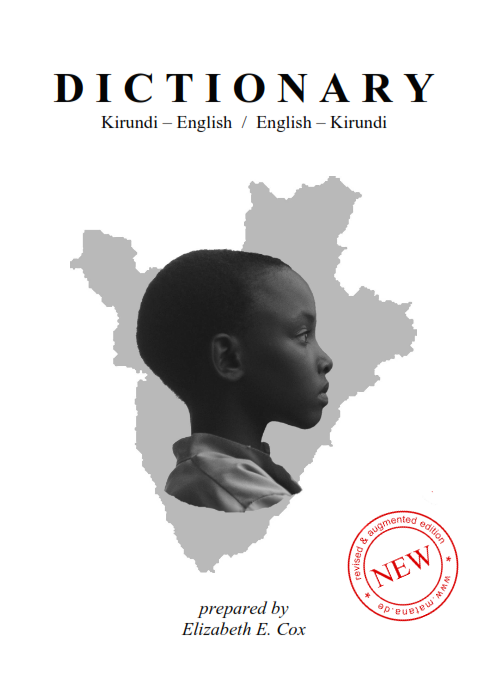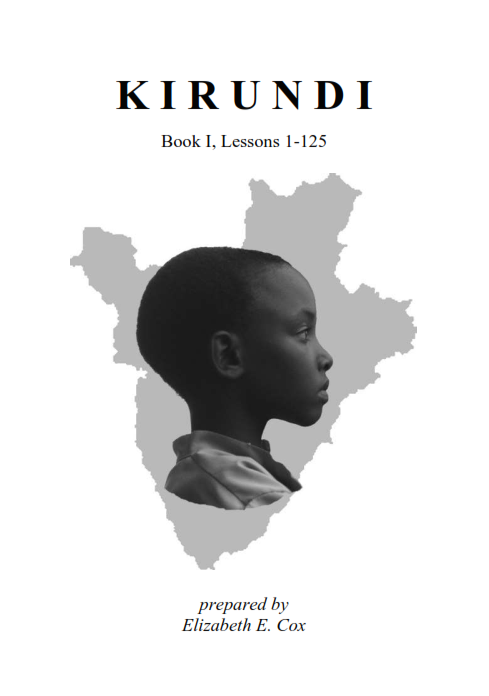witch doctor ▶ umupfumu
(certain kind) umumago
(to have him bewitch someone) kuraguza
(to have him divine) kuraguza
(to seek out evil doers) kuragura
(to take out objects from the body) guhura
(bits of things used for divining) agatēte
(stones, etc. which he claims to take from swollen places on body) umutundiro
(certain kind) umumago
(to have him bewitch someone) kuraguza
(to have him divine) kuraguza
(to seek out evil doers) kuragura
(to take out objects from the body) guhura
(bits of things used for divining) agatēte
(stones, etc. which he claims to take from swollen places on body) umutundiro
En-En dictionary
kwīrahuruza (-īrahuruje) v ▶ 1. to fail to keep a vow, 2. to do that which you declared you wouldn't
icōmore (ivy-) 4 class 4
singular: iki-,ic-
plural: ibi-,ivy- ▶ tree of which bark is used
singular: iki-,ic-
plural: ibi-,ivy- ▶ tree of which bark is used
igihōmbe (ibi-) 4 class 4
singular: iki-,ic-
plural: ibi-,ivy- ▶ something which appears to be strong but is weak
singular: iki-,ic-
plural: ibi-,ivy- ▶ something which appears to be strong but is weak
igishika (ibi-) 4 class 4
singular: iki-,ic-
plural: ibi-,ivy- ▶ thing which one longs for, strong desire
singular: iki-,ic-
plural: ibi-,ivy- ▶ thing which one longs for, strong desire
hate ▶ kwānka, kugaya, gukēngēra, gutītūra, guhama
(cause people to hate that which they had liked) gutītūra
(everything) kunebagura
(one's master) kugāmbāna
(cause people to hate that which they had liked) gutītūra
(everything) kunebagura
(one's master) kugāmbāna
En-En dictionary
word ▶ ijāmbo, amajāmbo, amagambo
(root or stem) itsina
(one who speaks with senseless repititions of ~) ikirogorogo
(to not keep one's ~, or to do that which you declared you wouldn't) kwīrahuruza
(root or stem) itsina
(one who speaks with senseless repititions of ~) ikirogorogo
(to not keep one's ~, or to do that which you declared you wouldn't) kwīrahuruza
En-En dictionary
gutīra (-tīze) v ▶ to borrow (money or a thing which will itself be returned)
gutīza (-tīje) v ▶ to lend, loan (that which will itself be returned)
inshūmbūshanyo (in-) 3 class 3
singular: i-,in-
plural: i-,in- ▶ compensation, that which replaces what one has lost
singular: i-,in-
plural: i-,in- ▶ compensation, that which replaces what one has lost
cliff ▶ agahanamo, umukuka, imānga, ikimānga, agatēmbwe
(from which unmarried pregnant girls are thrown) urusumanyenzi
(from which unmarried pregnant girls are thrown) urusumanyenzi
En-En dictionary
throw ▶ (to) guta, gutēra
(apart) gukumira
(at each other) gutēranya
(away) guta
(down) kujegeza
(down from above) gukorora
(forcefully) gushibura
(on ground) kwegura, gukungura
(out) gukugunya, kujugunyika
(stick on ground which tumbles end over end) kubirika
(water) kumīja
(apart) gukumira
(at each other) gutēranya
(away) guta
(down) kujegeza
(down from above) gukorora
(forcefully) gushibura
(on ground) kwegura, gukungura
(out) gukugunya, kujugunyika
(stick on ground which tumbles end over end) kubirika
(water) kumīja
En-En dictionary
wrong ▶ (a ~ done which deserves punishment) umuziro
(~ side of cloth) uruhande rubi rw'impuzu
(~ side of cloth) uruhande rubi rw'impuzu
En-En dictionary
ikoma (ama-) 5 class 5
singular: i-,iri-
plural: ama- ▶ framework of branches on which smaller ones are interlaced in building a house
singular: i-,iri-
plural: ama- ▶ framework of branches on which smaller ones are interlaced in building a house
ikibi (ibi-) 4 class 4
singular: iki-,ic-
plural: ibi-,ivy- ▶ that which is bad, evil
singular: iki-,ic-
plural: ibi-,ivy- ▶ that which is bad, evil
borrow ▶ (money, or that for which you'll return equivalent rather than that very thing) kugurāna
(a thing to be returned) gutīra
(a thing to be returned) gutīra
En-En dictionary
ikembe (i-) 3 class 3
singular: i-,in-
plural: i-,in- ▶ lamellophone composed of a hollowed-out box on which are fixed strips of metal or bamboo of various lengths
singular: i-,in-
plural: i-,in- ▶ lamellophone composed of a hollowed-out box on which are fixed strips of metal or bamboo of various lengths
urudubi (in-) 6 class 6
singular: uru-
plural: in- ▶ that which a person says or does for which he may be convicted, result of failure to keep promise, dilemma, difficulty
singular: uru-
plural: in- ▶ that which a person says or does for which he may be convicted, result of failure to keep promise, dilemma, difficulty
gutītūra (-tītūye) v ▶ 1. to hate, despise, 2. to disillusion, 3. to cause people to hate that which they had liked, 4. to lose original force, to weaken
kubirika (-biritse) v ▶ to throw stick on ground which tumbles end over end
respect ▶ isoni, icūbahiro
(that which is respected) igitīnyiro
(to ~) gusona, gusonera, kwūbaha
(to lack) kwūbahuka
(that which is respected) igitīnyiro
(to ~) gusona, gusonera, kwūbaha
(to lack) kwūbahuka
En-En dictionary
ikivumu (ibi-) 4 class 4
singular: iki-,ic-
plural: ibi-,ivy- ▶ tree of which bark is used for clothing
singular: iki-,ic-
plural: ibi-,ivy- ▶ tree of which bark is used for clothing
umuvumu (imi-) 2 class 2
singular: umu-
plural: imi- ▶ tree of which bark is used for clothing
singular: umu-
plural: imi- ▶ tree of which bark is used for clothing
igikānge (ibi-) 4 class 4
singular: iki-,ic-
plural: ibi-,ivy- ▶ ghost (thing which resembles person but has supernatural powers)
singular: iki-,ic-
plural: ibi-,ivy- ▶ ghost (thing which resembles person but has supernatural powers)
umumānda (imi-) 2 class 2
singular: umu-
plural: imi- ▶ tree of which bark was used for clothing
singular: umu-
plural: imi- ▶ tree of which bark was used for clothing
framework ▶ (of house) urukānka
(of branches on which smaller ones are interlaced) ikoma
(of branches on which smaller ones are interlaced) ikoma
En-En dictionary
igitīnyiro (ibi-) 4 class 4
singular: iki-,ic-
plural: ibi-,ivy- ▶ that which is feared or respected
singular: iki-,ic-
plural: ibi-,ivy- ▶ that which is feared or respected
umutundiro (imi-) 2 class 2
singular: umu-
plural: imi- ▶ stones, nails, etc., which witch doctor pretends to take from swollen place on body
singular: umu-
plural: imi- ▶ stones, nails, etc., which witch doctor pretends to take from swollen place on body
urusumanyenzi (in-) 6 class 6
singular: uru-
plural: in- ▶ 1. cliff from which unmarried pregnant girls are thrown, 2. pit, abyss
singular: uru-
plural: in- ▶ 1. cliff from which unmarried pregnant girls are thrown, 2. pit, abyss
ask ▶ (another to repeat to check his veracity) gucaca
(each other) kubazānya
(each other to explain) gusiguzānya
(each other riddles) gusōkōrānya
(for) gusaba
(for daily) kubōbōtereza
(frequently) gusabiriza
(many in order to verify) gushīshōza
(many questions) kubazagiza
(of someone that which he has promised) guhāngūra
(oneself) kwībaza, kwītsa
(over and over again) kubaririkiza
(persistently, though refused) gucuna
(question) kubaza
(a riddle) gusōkōza
(stupid questions) kudedēmvya
(each other) kubazānya
(each other to explain) gusiguzānya
(each other riddles) gusōkōrānya
(for) gusaba
(for daily) kubōbōtereza
(frequently) gusabiriza
(many in order to verify) gushīshōza
(many questions) kubazagiza
(of someone that which he has promised) guhāngūra
(oneself) kwībaza, kwītsa
(over and over again) kubaririkiza
(persistently, though refused) gucuna
(question) kubaza
(a riddle) gusōkōza
(stupid questions) kudedēmvya
En-En dictionary
do ▶ (to) kugira, gukora
(again) kwongera
(always) kwāma, guhora
(anyhow, in spite of) gupfa
(continually) kwāma, guhora
(the dishes) kwoza ivyombo
(even more) kurushiriza
(first) kubānza, gushūza
(forcefully) kwīhanukīra
(habitually) kumēnyera
(have too much to ~) kurēngerana
(the impossible) gufyidikīra
(~-it-yourself) ukugira utugenegene
(housework) kugora
(one's duty) gushimika
(quickly) gukwākwānya, gushōka, gusobaganya, gusūriranya, gutebūtsa
(quickly and carelessly) kuraha
(quickly without thinking) gusimbagurika
(~ not) -ōye (verb without infinitive)
(reluctantly) kwīyumānganya
(a sloppy job) kurēngagiza
(something alone) kwīgūnga
(something by oneself without authority) kwigenera
(something that causes pleasure or amazement) gusamāza
(that which you declared you would not ~) kwīrahuruza
(two things at once) kubāngikanya
(unwillingly) kugoyagoya
(unwillingly and complainingly) kunyinkira
(the washing up) kwoza ivyombo
(again) kwongera
(always) kwāma, guhora
(anyhow, in spite of) gupfa
(continually) kwāma, guhora
(the dishes) kwoza ivyombo
(even more) kurushiriza
(first) kubānza, gushūza
(forcefully) kwīhanukīra
(habitually) kumēnyera
(have too much to ~) kurēngerana
(the impossible) gufyidikīra
(~-it-yourself) ukugira utugenegene
(housework) kugora
(one's duty) gushimika
(quickly) gukwākwānya, gushōka, gusobaganya, gusūriranya, gutebūtsa
(quickly and carelessly) kuraha
(quickly without thinking) gusimbagurika
(~ not) -ōye (verb without infinitive)
(reluctantly) kwīyumānganya
(a sloppy job) kurēngagiza
(something alone) kwīgūnga
(something by oneself without authority) kwigenera
(something that causes pleasure or amazement) gusamāza
(that which you declared you would not ~) kwīrahuruza
(two things at once) kubāngikanya
(unwillingly) kugoyagoya
(unwillingly and complainingly) kunyinkira
(the washing up) kwoza ivyombo
En-En dictionary
grass ▶ ivyātsi, ubwātsi
(kind poisonous to cows) inzūzi
(pieces of a certain kind used for weaving) agatēte
(tall) ubwātsi
(in water) igikāngaga
(~ knife) umupānga
(to cut) gukera, gukerera, gutema
(to cut for use) kwāhira
(to dig out rapidly) gusūriranya
(to gather up that which has been spread out) gusasūra
(to leave grass growing in kraal) gutongoza
(to spread) gusasa
(to spread around something, as coffee) gusasira
(to weed out quickly) kurandagura
(kind poisonous to cows) inzūzi
(pieces of a certain kind used for weaving) agatēte
(tall) ubwātsi
(in water) igikāngaga
(~ knife) umupānga
(to cut) gukera, gukerera, gutema
(to cut for use) kwāhira
(to dig out rapidly) gusūriranya
(to gather up that which has been spread out) gusasūra
(to leave grass growing in kraal) gutongoza
(to spread) gusasa
(to spread around something, as coffee) gusasira
(to weed out quickly) kurandagura
En-En dictionary
keep ▶ kugumya
(a fire going) gucānira
(for the night) kurāza
(law) kwītōndera
(things for oneself) kwīgūnga
(too long) gutebana
(not ~ one's wordto do that which one has declared he would not do) kwīrahuruza
(a fire going) gucānira
(for the night) kurāza
(law) kwītōndera
(things for oneself) kwīgūnga
(too long) gutebana
(not ~ one's wordto do that which one has declared he would not do) kwīrahuruza
En-En dictionary
lend ▶ (that for which equivalent will be returned) kugurāna
(that which will itself be returned) gutīza
(something and not get it back soon) gutongoza
(money) kugurana, gukopesha amahera
(that which will itself be returned) gutīza
(something and not get it back soon) gutongoza
(money) kugurana, gukopesha amahera
En-En dictionary
strong ▶ (person) umunyenkomezi
(something which appears to be ~, but is weak) igihōmbe
(to be) guhāngama, gukomera, kurema, kurama, kunōnōka
(to be very) gutetera, gushikama
(to make) gukomeza
(to make very) gushikama
(to remain) gushikama
(something which appears to be ~, but is weak) igihōmbe
(to be) guhāngama, gukomera, kurema, kurama, kunōnōka
(to be very) gutetera, gushikama
(to make) gukomeza
(to make very) gushikama
(to remain) gushikama
En-En dictionary
stumble ▶ (that which causes to) igitsītāza
(to ~) gutsītāra, kudāguza
(to cause to) gutsītāza
(over words) gufudika
(to ~) gutsītāra, kudāguza
(to cause to) gutsītāza
(over words) gufudika
En-En dictionary
tree ▶ igiti
(fruit tree) igiti c'ivyamwa
(base of) igitsina, itsina
(trunk) umutūmba
(small ones around big one) umuvyāro
(big spreading) umutagare
(palm) ikigazi
(small, palmlike) igisāndasānda
(of whih bark was used for clothing) umumānda, icōmore, umuvumu, ikivumu
(of which bark is used for rope) umuvūmvu
(to be many) gusagāra
(to climb) kwūrira
(to climb down) kwūruruka
(to cut) gukera, gutema, guca
(to cut off top) gukēmūra
(trees grown very close together) impatane
(fruit tree) igiti c'ivyamwa
(base of) igitsina, itsina
(trunk) umutūmba
(small ones around big one) umuvyāro
(big spreading) umutagare
(palm) ikigazi
(small, palmlike) igisāndasānda
(of whih bark was used for clothing) umumānda, icōmore, umuvumu, ikivumu
(of which bark is used for rope) umuvūmvu
(to be many) gusagāra
(to climb) kwūrira
(to climb down) kwūruruka
(to cut) gukera, gutema, guca
(to cut off top) gukēmūra
(trees grown very close together) impatane
En-En dictionary
kugurāna (-gurānye) v ▶ 1. to exchange, 2. to lend, 3. borrow (money, or that for which you'll return equivalent rather than that very article), 4. to swap
kuremara (-remaye) v ▶ 1. to be crooked (e.g. broken bone which has healed wrongly), 2. to be paralyzed
kuzūnguruka (-zūngurutse) v ▶ to go around, to cycle (the stem 'zungu' is also the origin of umuzungu, which does not mean 'white person' but rather 'someone going around', describing the first European explorers)
he ▶ which?
which found in: Kirundi I (Study lessons)
lesson 1 ▶ Class 1 umu–, aba–
lesson 2 ▶ Ni and Si
lesson 3 ▶ Possessive Adjective
lesson 4 ▶ Class 2 umu–, imi–
lesson 10 ▶ Review 1 - 9
lesson 13 ▶ Class 4 iki–, ibi–
lesson 16 ▶ –ra Present Tense of Verb
lesson 18 ▶ Class 5 i–, ama–
lesson 19 ▶ Class 5 i–, ama– & Continuous present
lesson 20 ▶ Review 11 - 19
lesson 21 ▶ Verb –fise
lesson 25 ▶ Prefixless Present Tense
lesson 29 ▶ Future Tense
lesson 35 ▶ Vowel-stem Verbs
lesson 40 ▶ Review 31 - 39
lesson 45 ▶ Verb –zi (To know)
lesson 47 ▶ Word Order
lesson 51 ▶ Ordinary Past Tense I
lesson 53 ▶ Past Verb Endings
lesson 57 ▶ Object Pronouns I
lesson 64 ▶ Stative Voice
lesson 65 ▶ –o with the Infinitive
lesson 71 ▶ Far Past Tense
lesson 74 ▶ Brother and Sister
lesson 75 ▶ Immediate Past (or, –ra– Past)
lesson 78 ▶ Causative Verbs I
lesson 80 ▶ Objects with Causatives
lesson 86 ▶ Demonstrative Adjectives I
lesson 88 ▶ Demonstrative Adjectives III
lesson 90 ▶ Review 82 - 89
lesson 93 ▶ Demonstrative Pronouns
lesson 94 ▶ Relative Clauses
lesson 95 ▶ Relative Clauses (No noun antecedent)
lesson 96 ▶ Pronoun nde?
lesson 97 ▶ Adjective –he?
lesson 98 ▶ Prepositional Form of Verb
lesson 102 ▶ Miscellaneous Words
lesson 104 ▶ Uses of Nta
lesson 106 ▶ Reciprocal Form of Verb
lesson 109 ▶ How to Say “Why?”
lesson 111 ▶ How to Say “Some”; The Conditional
lesson 112 ▶ Adjectives Expressed by Verbs
lesson 113 ▶ Reduplicated Verbs
lesson 116 ▶ Ki and Umuki
lesson 119 ▶ More Adverbs
lesson 123 ▶ Narrative Tenses I
which found in: Kirundi II (Grammar)
chapter 1 ▶ Compound Past Tenses
chapter 3 ▶ Conditional Sentences – “if”
chapter 7 ▶ “never-yet” Tenses
chapter 10 ▶ –o– Conditional in Present, Past and Future
chapter 12 ▶ Subjunctive used for Contrasting Statement
chapter 13 ▶ Subjunctive in Series of Future Happenings
chapter 15 ▶ –ribu– Tenses
chapter 18 ▶ Optative Mood
chapter 19 ▶ Strong Negative Imperatives
chapter 24 ▶ “still” and “no longer” in the Past and Future
chapter 26 ▶ Special Verb Endings
chapter 35 ▶ Special uses of kuba
chapter 39 ▶ –tuma used to show Reason or Cause
chapter 47 ▶ Expressions like “after a year”
chapter 48 ▶ Nouns with 3rd class singular and 5th plural
chapter 49 ▶ Notes about the Diminutive
chapter 54 ▶ Comparisons
chapter 57 ▶ ni with Pronouns
chapter 61 ▶ “whatever, whoever, whenever, wherever”
chapter 71 ▶ Conjunction ko
chapter 73 ▶ How to say “without”
chapter 76 ▶ Affirmative and Negative Words
chapter 79 ▶ Various Expressions
which found in: Imyibutsa (proverbs)
Umwibutsa 33 ▶ Ahari amahoro umuhoro uramwa....











 printable PDF files.
printable PDF files.

 This unique dictionary by Betty Cox is known for the deep cultural insight it provides to many Kirundi terms. It has been thouroughly revised, adapted to present-day Kirundi orthography rules and many new words and meanings have been added.
This unique dictionary by Betty Cox is known for the deep cultural insight it provides to many Kirundi terms. It has been thouroughly revised, adapted to present-day Kirundi orthography rules and many new words and meanings have been added. The Kirundi self study course guides you through 125 lessons and makes you learn both the necessary vocabulary and basic grammar.
The Kirundi self study course guides you through 125 lessons and makes you learn both the necessary vocabulary and basic grammar. English pronunciation by
English pronunciation by



